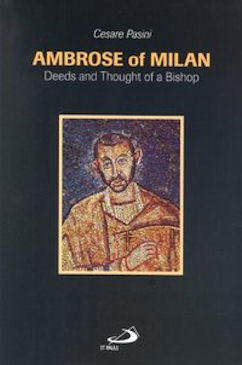
|
Posted November 19, 2013
Book: Ambrose of Milan: Deeds and Thought of a Bishop Author: Cesare Pasini St. Pauls. Statan Island, NY. 2013. Pp. 323 An Excerpt from the Jacket:
Ambrose of Milan (340-397), a great Father of the early church and one of the four Doctors of the West (with Augustine, Jerome and Gregory the Great) was born into a noble Christian Family. In 374, during his service as governor of the Roman province of Liguria and Aemelia, he was called by extraordinary popular demand to become the Bishop of Milan. Fully involved in the affairs of his people, Ambrose was a strictly orthodox pastor who held fast to the faith of Nicea against the Arian heresy rampant at the time. He was a concerned father who preoccupied himself with the needs of the faithful in Milan using his own wealth and property in the process. An energetic defender of the faith, he was not afraid to oppose the Roman Emperor when such was called for. But Ambrose, in this biographyby noted scholar Cesare Pasini, comes across above all as a Bishop. The reader will find here a pastor who knew how to enliven his community with his imaginative preaching and solid catechesis, with the celebrations surrounding the sacramental rites, and his dedicated work for justice profoundly animated by charity, and with a sense of equilibrium in his judgements based on ethics and Christian spirituality. Often this biography cites from the ancient testimonies which history has left us about Ambrose and, even more, from the writings handed down to us by Ambrose himself. In ths way, the reader can better penetrate the soul of the protagonist enjoying the captivating words of the Bishop himself. An Excerpt from the Book: The venerable Bishop was a man of great abstinence, of many vigils and labors. He weakened his body with daily fasts. In particular he usually would not take food before evening, but with a sense of moderation and out of respect for the solemn days of the ecclesial life he suspended this penance on "Saturday and Sunday or w hen the anniversaries of the more venerated martyrs were celebrated. The biographer recalls still other practices of Ambrose so typically monastic as his "assiduousness in prayer day and night," also his labouriousness in writing in his own hand the works that he was composing in a letter to Sabinus Ambrose himself states, "I have not told all on the copyist, especially at night, during which I do not wish to be a burden and inconvenience to others" and even his resistence to fatigue in ecclesiastical functions. Table of Contents: 1. Episcopal election of Governor Ambrose 2. Family roots and his youth 3. His early formation and "Father" Simplician 4. "Take heart, heal the ills of the people" 5. Guide to monks and consecrated virgins 6. Marcellina and Satyrus 7. Aquileia: Sept. 3, 381 8. Roman traditon and Christian innovation 9. A contested basilica and people bound to their bishop 10. "Because I don't deserve to be a martyr, I have acquired these martyrs for you" 11. Augustine, son of the Church of Milan 12. Anti-semitism? 13. An effective aid to social life 14. "I have loved this man" 15. In the service of the word 16. Concern for the Church 17. Effusive fragrance and sober inebriation 18. The "encounter" 19. Saint Ambrose |
|
